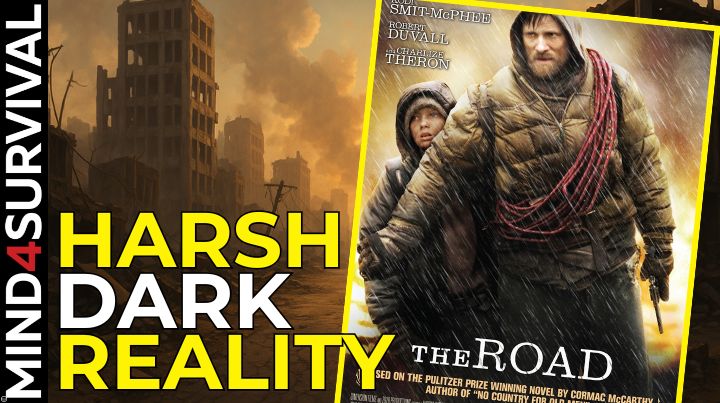Most survival films sell you adrenaline. The Road strips that away and leaves you with something harder to face: the slow, brutal grind of collapse when everything—food, hope, morality—is running on fumes.
It’s not exciting. It’s not comforting. But it’s honest.
This is a story about what it really means to survive long after the world has ended. No government. No rescue. No clean water. Just a father and his son pushing forward through ash and silence. What makes it powerful isn’t action—it’s the quiet decisions made when there’s nothing left to lose.
If you want a movie that shows the ugly truth of long-term disaster—and why mindset matters even when hope doesn’t—this one deserves your time. Keep watching. This one stays with you.
(Disclaimer: This article contains affiliate links for which I may receive a small commission at no cost to you if you choose to purchase a product through a link on this page.)
TL;DR: The Road is not fun—but it’s honest. This movie shows the raw truth of what long-term collapse might look like. It’s for anyone who wants to feel what it means to survive without the usual Hollywood filters.
Quick Look at What You’ll Learn
Watch the Official Trailer for The Road
Ratings & Reviews at a Glance
Why I Like This Movie
I’ve watched The Road several times—and even though it’s dark and depressing, I keep coming back to it. Why? Because it shows something most movies avoid: a father refusing to quit, no matter how bad things get, in an excellent view of a slowly dying world.
There’s no wonderful twist of fate. No tactical heroism or Hollywood-sponsored gear montages. Just a man doing everything he can to protect his son in a world filled with cannibals, starvation, and despair. And even in that end-of-days landscape, he tries to give his son some kind of normal. They brush their teeth. They follow rules. They carry the fire.
It’s also brutally honest about how long-term societal collapse works. Supplies run out. People lose hope. Even his wife—who couldn’t take it anymore—walks off into the cold to die. That’s the part no one talks about when they glamorize “the end of the world.” This movie does.
And that’s why I respect it.
What It Gets Right
- Collapse isn’t exciting—it’s exhausting.
- People change when pushed past the limit.
- Love and mindset are often the last tools left.
- Most people won’t be heroes. They’ll be lucky to live.
What It Gets Wrong
- The pace can be painfully slow for some viewers.
- The soundtrack is overused to cue emotion.
- The son, while symbolic, sometimes feels underdeveloped.
Preparedness & Survival Lessons
1. Long-Term Collapse Means Running Out
No scavenging scene feels staged. You feel the scarcity. When society fails for good, stored food runs out. Then it’s down to foraging and pure desperation.
2. Mindset Is Survival
Viggo’s character keeps going—not because he has a plan—but because of human desire. In a world filled with suicide, cannibals, and despair, his mindset is what keeps him alive.
3. Morality Gets Tested Daily
The scene with the cannibals says it all. Do you try to reason with the most evil? In a collapsed world, your moral compass is either a weapon or a weakness.
4. Normalcy Matters, Even in Collapse
The father tries to maintain routine and rules for his son: brushing his teeth, talking about life lessons, telling him of the past, and sheltering him from the worst horrors. That structure becomes survival in itself.
5. Collapse Doesn’t Mean Everyone Dies at Once
People imagine the apocalypse as fast. This is slow death. Nature is still there, but poisoned. Most people are already gone. What’s left is starvation, cruelty, and occasional kindness.
My Favorite Moments and Scenes
- Bunker Discovery: The moment they find a hidden food stash underground is a rare glimpse of relief. It reminds us why redundancy and hidden supplies matter.
- Flashbacks with the Mother (Charlize Theron): Her decision to walk into the cold underscores the psychological toll that survival can take—especially when hope is gone.
- Conversation with Son: Despite the dire situation, when losing his humanity would be so easy, the characters do their best to hold on to what little humanity they can.
Additional Resources
Frequently Asked Questions
It’s based on the Pulitzer Prize–winning novel by Cormac McCarthy. The story imagines a global catastrophe and focuses on how one father and son survive in its aftermath.
Viggo Mortensen plays the father, Kodi Smit-McPhee plays his son, and Charlize Theron appears in flashbacks as the mother.
No. There are no zombies, aliens, or monsters—just desperate people doing whatever it takes to stay alive. The horror in this film is grounded in realism.
The movie was filmed in several real-life desolate locations across Pennsylvania, Oregon, and Louisiana to reflect the harsh, post-apocalyptic setting.
No. The Road is rated R for a reason. It’s emotionally intense, violent, and bleak—definitely not suitable for young viewers.
📌 Let’s TalkWatch The Road and think about what you’d do in a world where hope is running on empty. Would you make the same choices? Could you carry the fire for someone else? Then come back here and share your thoughts in the comments. Whether it’s a quick reaction or a full breakdown, your perspective can help others see what real survival might look like.
Read the full article here





